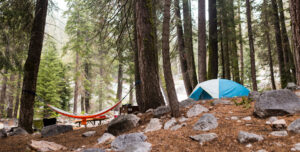Camping on the beach may be illegal in certain areas. A closer look at local regulations is necessary to determine whether camping is allowed.
Camping on the beach is a popular choice for outdoor enthusiasts seeking a unique and immersive experience. However, it is important to be aware of the legalities associated with camping in such locations. While beaches offer scenic views and tranquil surroundings, some areas have strict regulations regarding camping activities.
Before pitching a tent on the sandy shores, it is crucial to understand the specific rules and regulations enforced by local authorities. Violating these regulations may result in fines or other penalties. We will explore the legality of camping on the beach and provide insights into the factors that determine whether it is permitted or forbidden in certain areas.

Credit: www.npr.org
Understanding Local Laws And Regulations
Researching Beach Camping Regulations In Your Area
Before embarking on a beach camping adventure, it’s essential to research and understand the local laws and regulations that govern camping on the beach. Different areas have different rules, and violating these regulations can lead to fines or other penalties.
Here are a few key points to consider when researching beach camping regulations in your area:
- Local ordinances: Start by familiarizing yourself with the local ordinances that govern beach camping. These can vary from city to city, so do some online research or reach out to the local authorities to find out the specific rules for the area you plan to visit.
- Permit requirements: Some beaches may require campers to obtain a permit before setting up camp. Look into whether a permit is necessary and how to obtain one. Keep in mind that permit requirements may change depending on the time of year or other factors.
- Campsite limitations: Many beaches have specific designated camping areas, often referred to as campsites. These areas may have restrictions on the number of tents or campers allowed, as well as guidelines on where exactly you can set up your campsite. Familiarize yourself with these limitations to ensure you camp in compliance with the regulations.
- Duration of stay: Some beaches allow overnight camping, while others may specify a maximum number of nights you can stay. Make sure you know how long you are permitted to camp on the beach. Exceeding this limit may result in fines or eviction.
- Fire regulations: Beaches often have strict regulations regarding open fires. These rules are in place to prevent wildfires and protect the environment. Check whether campfires or cooking fires are allowed, and if so, whether you need to bring your own fire ring or if there are designated fire pits available.
Consultation With Local Authorities And Experts
While conducting your research, it’s always a good idea to reach out to local authorities and experts for clarification and guidance. Consulting with the following can provide valuable insights and help you better understand the beach camping regulations:
- Local park rangers or authorities: These professionals are well-versed in the regulations and can provide you with specific information about beach camping in the area. They can answer any questions you may have and provide guidance on how to comply with the rules.
- Beach camping communities: Joining online communities or forums dedicated to beach camping can also be a great resource. Fellow campers who are familiar with the area may be able to share their experiences and offer advice on navigating the local regulations.
- Environmental experts: It’s important to consider the environmental impact of beach camping. Seek advice from environmental experts or organizations to understand how to minimize your ecological footprint and follow any guidelines related to protecting the natural habitat of the beach.
Staying Informed About Changes In Beach Camping Laws
Beach camping regulations can evolve and change over time, so it’s crucial to stay informed and up-to-date. Here are some tips to ensure you are well-informed about any changes in beach camping laws:
- Regularly check official websites: Local government websites or official tourism websites often provide the most accurate and current information about beach camping regulations. Make it a habit to check these websites periodically, especially before planning a trip.
- Subscribe to newsletters or alerts: Sign up for newsletters or alerts from relevant authorities or organizations to receive updates on any changes to beach camping regulations. This way, you’ll be notified directly and can adjust your plans accordingly.
- Follow social media accounts: Local park authorities or tourism organizations often share updates on their social media platforms. By following these accounts, you can stay informed about any changes or announcements regarding beach camping regulations.
Remember, adhering to local beach camping regulations not only ensures a hassle-free camping experience but also preserves the natural beauty of the beach for future campers to enjoy.
Environmental Impact And Conservation Efforts
Examining The Impact Of Camping On Coastal Ecosystems
Camping on the beach may seem like a dream vacation, with the soothing sound of crashing waves and beautiful sunsets as your backdrop. However, it’s important to consider the environmental impact that camping can have on coastal ecosystems. Here are some key points to take into account:
- Increased foot traffic: With an influx of campers, beaches can experience a significant increase in foot traffic. This can result in erosion of dune systems and delicate coastal vegetation, which play a crucial role in preserving the shoreline and providing habitats for various species.
- Pollution: Camping often leads to increased waste production, including trash, food waste, and potentially harmful substances such as chemical cleaners or personal care products. If left unmanaged, these pollutants can find their way into the ocean, negatively impacting marine life and water quality.
- Disturbance to wildlife: Coastal areas are often home to a diverse range of wildlife, including nesting birds, sea turtles, and marine mammals. Camping activities can disrupt their natural behavior and breeding patterns, leading to stress and decreased reproductive success.
Protecting Fragile Habitats And Wildlife
To mitigate the negative impact of camping on coastal ecosystems, it’s crucial to prioritize the protection of fragile habitats and wildlife. Here are some considerations:
- Implementing camping regulations: Beaches and coastal areas often have specific camping regulations in place to protect the environment. These may include designated camping areas, restrictions on certain activities, and rules for waste management. Compliance with these regulations is essential to minimize the impact on sensitive ecosystems.
- Educating campers: Promoting environmental awareness among campers is key in fostering responsible behavior. Providing information about local wildlife and habitats, as well as guidelines for minimizing disturbance, can help campers understand their role in conservation efforts.
- Supporting conservation initiatives: Many organizations and local communities actively work towards preserving coastal ecosystems. By supporting these efforts through volunteer work, donations, or participating in conservation programs, you can contribute to the long-term protection of fragile habitats and wildlife.
Responsible Beach Camping Practices For Conservation
When camping on the beach, practicing responsible and environmentally-conscious behavior is crucial. Here are some practices to consider:
- Minimize waste: Pack and prepare food with minimal packaging, and properly dispose of any waste in designated containers. Avoid using disposable products and instead opt for reusable items whenever possible.
- Choose suitable camping spots: Set up your campsite away from fragile dune systems, vegetation, and wildlife nests. Stick to designated camping areas and avoid creating new paths that can cause erosion.
- Leave no trace: When it’s time to leave, ensure that you leave the beach as pristine as you found it. Remove any traces of your presence, including trash, tent pegs, and campfire remnants.
- Respect wildlife and their habitats: Observe wildlife from a distance and avoid approaching or disturbing them. Adhere to any specific guidelines for nesting birds, sea turtles, or other protected species in the area.
By examining the environmental impact of camping on coastal ecosystems, protecting fragile habitats and wildlife, and adopting responsible beach camping practices, we can ensure that future generations can continue to enjoy the beauty of the beach while preserving its natural wonders.
Let’s be mindful campers and help conserve our coastal treasures.
Safe And Enjoyable Beach Camping Tips
Camping on the beach can be an incredible experience, allowing you to unwind and connect with nature while enjoying the soothing sound of crashing waves. However, before you embark on your beach camping adventure, it’s important to be well-prepared and informed.
In this section, we will explore essential gear and equipment for beach camping, choosing the right camping spot on the beach, and safety precautions and considerations to ensure a safe and enjoyable beach camping experience.
Essential Gear And Equipment For Beach Camping
When packing for your beach camping trip, it’s crucial to have the right gear and equipment to make your stay comfortable and hassle-free. Here are some essential items you should consider bringing:
- Tent: Choose a sturdy, waterproof tent that can withstand the elements. Ensure it has proper ventilation to keep you cool during warm nights.
- Sleeping gear: Invest in quality sleeping bags, sleeping pads, and pillows to ensure a good night’s sleep.
- Beach chairs and blankets: Relax and soak up the sun with comfortable beach chairs and blankets.
- Beach umbrella and shade shelter: Protect yourself from the hot sun by bringing a beach umbrella or portable shade shelter.
- Cooler: Keep your food and drinks fresh by bringing a cooler stocked with ice.
- Portable grill or cooking stove: Enjoy delicious beachside meals with a portable grill or cooking stove.
- Cooking utensils and kitchenware: Don’t forget essentials like pots, pans, plates, and utensils for cooking and eating meals.
- Sanitation supplies: Pack toilet paper, hand sanitizer, and garbage bags to keep your campsite clean and hygienic.
- Flashlights and lanterns: Bring along portable lighting options to navigate during nighttime.
- Sunscreen and bug repellent: Protect your skin from sunburns and keep pesky insects at bay with sunscreen and bug repellent.
Choosing The Right Camping Spot On The Beach
Selecting the perfect camping spot on the beach can make all the difference in your camping experience. Consider the following factors when choosing your camping area:
- Local regulations: Check with local authorities or park management to ensure beach camping is allowed and if any permits are required.
- Beach access: Look for easy access points to the beach and ensure there are no restrictions on camping in that particular area.
- Tides and high water levels: Take note of tidal patterns and make sure your chosen spot is not prone to unexpected high tides or flooding.
- Distance from shoreline: Set up your campsite at a safe distance from the water to avoid any potential hazards, such as rising tides or high waves.
- Shade and wind protection: Look for spots with natural shade or bring your own shade shelter. Consider wind direction and choose a location that offers protection from strong gusts.
- Privacy: If you prefer a more secluded camping experience, choose a spot away from crowded areas or popular tourist spots.
Safety Precautions And Considerations For Beach Camping
While beach camping can be an amazing adventure, it’s important to prioritize safety. Here are some safety precautions and considerations to keep in mind:
- Weather conditions: Stay informed about weather forecasts and be prepared for changing conditions. Seek shelter in case of storms or severe weather.
- Water safety: Pay attention to beach flag warnings and only swim in designated areas. Be mindful of strong currents and rip tides that can pose a risk.
- Fire safety: Check if fires are permitted on the beach and follow local regulations. Always keep a bucket of water or sand nearby to extinguish the fire properly.
- Wildlife encounters: Research if there are any wildlife species in the area and take necessary precautions to prevent encounters. Store food securely to avoid attracting animals.
- Leave no trace: Practice leave no trace principles by packing out all your trash, disposing of waste properly, and respecting the natural environment.
- Emergency preparedness: Have a first aid kit readily available and familiarize yourself with emergency procedures in the area. Carry a charged phone or communication device in case of emergencies.
By following these safe and enjoyable beach camping tips, you can make the most of your outdoor adventure while ensuring your safety and preserving the beauty of the beach environment. So, pack your beach gear, set up camp, and get ready to experience the serenity and beauty that beach camping has to offer!
Conclusion
Camping on the beach can be a great way to enjoy nature and relax, but it’s important to be aware of the laws and regulations in place. While regulations vary from place to place, in general, most beaches have restrictions on camping due to environmental concerns and the need to protect the natural habitat.
Before planning a beach camping trip, it’s crucial to research and understand the rules specific to the beach you are interested in. This will help you avoid any potential legal issues and ensure a positive experience for both you and the environment.
Always remember to leave no trace, respect the beauty of the beach, and be mindful of the impact we have on these fragile ecosystems. Camping responsibly and following the guidelines in place will not only protect the beach but also preserve it for future generations to enjoy.
So, if you’re dreaming of a beach camping adventure, make sure to do your research and plan accordingly to ensure a safe and enjoyable experience.




